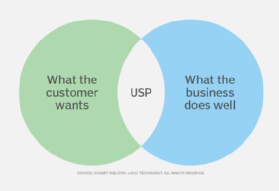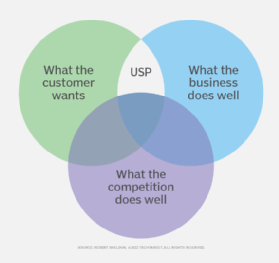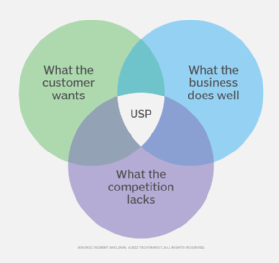unique selling point (USP)
What is unique selling point (USP)?
A unique selling point (USP), also called a unique selling proposition, is a marketing statement that differentiates a product or brand from its competitors. A USP might boast the lowest cost, the highest quality, the most experience, the first in its product class or another trait that sets the offering apart from the competition. A unique selling point can be thought of as "what you have that competitors don't."

A successful USP promises a clearly articulated benefit to consumers, offering them something that competitive products can't or don't offer. The USP should also be compelling enough to attract new customers. It carefully balances what the customer wants with what the business does well or what it can deliver that the others cannot. The idea is to make the product or brand stand out from the competition in some unique way. The USP should appeal to what the customer cares about and clearly differentiate the company's offering from everyone else (see Figure 1).

When developing a unique selling point, an organization should pay close attention to its market concentration and the competition, factoring in their strengths and weaknesses and identifying ways to set the brand or product apart from theirs. The organization must be able to clearly express these differences in a way that puts its offering in a better light than the competition's. The USP must still balance what the customer wants with what the business does well, but it should do it in a way that takes into account what's happening across the market (see Figure 2).

One way to approach the USP is to consider what the competition lacks and how the organization's product or brand addresses that lack. Another way to think about it is in terms of what the market lacks as a whole. The idea is to use market intelligence to determine how the organization's offering can meet this need and then develop a unique selling point that takes into account what's lacking, along with what the customer wants and what the business does well (see Figure 3).
A USP is sometimes formally expressed in a positioning statement, which articulates how a product or brand meets a consumer need in a way that its competitors do not.
What are unique selling point examples?
An effective USP distinguishes a product or brand from the competition in a way that compels customers to want to learn more about the offering and consider other aspects of the company's messaging. Here are several examples of effective unique selling points:
- Canva: Empowering the world to design. Canva is an online graphic design tool that simplifies the design process for all types of users. Its USP implies a platform that is highly usable and has been universally embraced, reinforcing the message that the service caters to a wide range of users who find it easier to use than alternative products.
- Hiut Denim Co.: Do one thing well. Unlike many companies, Hiut Denim makes jeans and nothing else. But rather than shying away from this fact, the brand capitalizes on it in its marketing. The USP suggests a company that knows what it's doing because it focuses exclusively on one thing and is not as prone to distraction as the competition.
- Patagonia: We're in business to save our home planet. With its USP, Patagonia establishes itself as something more than just a clothing retailer, offering a mission statement as well as a selling point. The USP helps to set the brand apart from the competition, while appealing to customers who are concerned about the environment and want to feel good about their purchases.
- Peet's Coffee: The original craft coffee. The first Peet's Coffee opened on April 1, 1966, in Berkeley, Calif., sparking a coffee revolution that eventually spread across the U.S. and is still being felt today. The USP takes advantage of this history to set Peet's apart from other coffee vendors and establish itself as the company with the type of experience and know-how its competition lacks.
- Shopify: The platform commerce is built on. Shopify is a leading e-commerce website that offers tools for selling merchandise online. Millions of businesses in 175 countries now use the service. Shopify's USP draws attention the company's prominent position in the market, its widespread popularity and its overall usability, suggesting to customers that this is where they should go to get the job done right.
See also: test marketing, contextual marketing, buzz marketing, internal marketing, relationship marketing, competitive differentiation.
